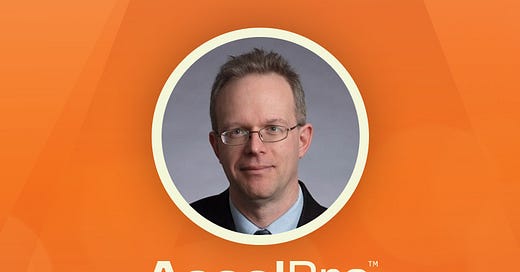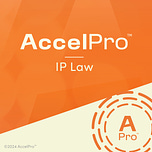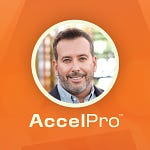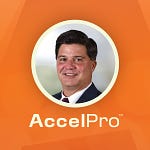Listen on Apple Podcasts, Spotify and YouTube.
Welcome to AccelPro IP Law, where we provide expert interviews and coaching to accelerate your professional development. Today we’re featuring a conversation with Mike Borella, Chair of MBHB’s Software Practice Group, and co-Chair of the firm’s Diversity and Inclusion Committee.
Artificial intelligence, patent reform and ambiguity in the patent process are creating new challenges for legal practitioners. In this conversation, we explore Borella’s roots in the tech world and his transition to patent law, while detailing the potential – and potential hazards – of leveraging generative AI to assist with legal work.
We also discuss how companies and portfolio holders should prioritize acquiring new patents and how to best evaluate what should be patented and what should not.
Listen on Apple Podcasts, Spotify and YouTube.
Interview References:
Michael Borella’s MBHB profile.
3:30 | Why we think AI can be an inventor on a patent application. McDonnell Boehnen Hulbert & Berghoff LLP. (2023).
7:57 | Artificial Intelligence. USPTO (US Patent and Trademark Office).
10:45 | 35 USC § 101: Statutory Requirements and Four Categories of Invention. (2015). Office of Patent Legal Administration. United States Patent and Trademark Office.
Supplemental Materials:
Borella, Michael. Guide to critical US patent policy developments on artificial intelligence so far in 2023. (June 13, 2023). IAM.
Host Brickman, Jonathan. (August 2, 2022). Mike Borella, Partner at McDonnell Boehnen Hulbert & Berghoff LLP (No. 61) [Audio podcast episode]. Latte with a Lawyer.
TRANSCRIPT
I. ARTIFICIAL INTELLIGENCE AND IP LAW
Neal Ungerleider, Host: Let’s jump right in: I know that artificial intelligence and IP law have both been on your mind. I read your article on why you think AI can be an inventor on a patent application. Can you tell me a bit more about that?
Mike Borella: This came out of a Supreme Court amicus brief that myself and several of my colleagues filed. Unfortunately, the court made its decision on the petition of certiorari, and they denied it. So they're not going to review that decision. As it stands right now, the way that the law has been interpreted is that in the US only human beings can be inventors on patent applications and ultimately on patents. But we think that there's a compelling reason to expand that into these new generative AI models out there. If you've spent enough time playing with Stable Diffusion or DALL-E or ChatGPT, you know that these models can create things that are new.
There are individuals who have contended, and these contentions are undisputed so far, that they've programmed an AI system with a certain set of constraints about the physical world, asked it to solve certain problems, and it did. It's created new inventions. So, if you take those contentions as true—which, so far, nobody has disputed—then it doesn't make sense for those inventions to be unpatentable.
If an AI, for example, creates a new drug, pharmaceutical compound, or method of treatment that, let's say, puts Type 2 diabetes into remission, who is going to pay for all of the Phase 1, Phase 2, Phase 3 trials and getting it through the FDA if, after all that happens, anybody can just make the drug? There is a compelling reason to consider that an AI can be an inventor, and all of the issues about who owns what can easily be handled by contract law. We see all upside to this and really no downside at all.
NU: Would this be human beings and the AI software listed as co-inventors?
MB: That's certainly one scenario, but another scenario might be that the sole inventor is the AI. For example, if I program an AI with enough information to make decisions about how a product or service might be built or generated, and I just provide a prompt and I say, “Please solve this problem,” this is very analogous to me being a manager or owner of a company walking into the research lab and saying to a bunch of scientists, “Hey, here's a problem we need to solve. Go figure it out.” And then the scientists solve the problem. In that case, they would be the inventors and I wouldn't be, but in many of these generative AI models, the human being is just providing a prompt, and the model is doing everything after that.
In many cases like that, the AI might be the sole inventor, and if the AI is the sole inventor today, you can't get a patent on the invention. If there is a co-inventor situation between a human and an AI, then it seems like you can—if you list the human and omit the AI. But that opens up a whole new can of worms about exactly how much did the human invent. All of this has yet to be thoroughly litigated in the courts. We were hoping that the Supreme Court would step in and set things straight, but it seems like maybe they think the issue is not ripe enough, or maybe they think it's something better handled by Congress. We'll see.
NU: At a high level, do approaches to AI as inventors and patent applications vary between the United States and other countries and jurisdictions?
MB: In short, yes. It seems that every country is in parallel asking itself the same question. In some jurisdictions, they put an AI down as an inventor and in other jurisdictions, like ours, there are variations. I expect there to be something of a patchwork across the world until there is some general consensus across the different jurisdictions about how to handle AI as inventors.
NU: It sounds like here in the United States, the guidance regarding works created by generative AI is changing pretty rapidly.
MB: That is true. This is something that the USPTO is currently considering. It's certainly something that we're going to see more and more of because I don't think these generative AI models are going to go away anytime soon. If anything, they're going to continue to get better. How much better? We don't know, but they are going to be around; they're already heavily used. This is something that if the patent office, and the courts, and/or Congress don't address soon, they'll have to address eventually. It's just a matter of when.
—
II. CHANGES IN PATENT LAW AND REGULATION
NU: What are some of the biggest issues right now in patent law from both the current administration and the current Congress?
MB: The interesting thing is that the Biden administration hasn't really made any transformative changes to how the USPTO operates. That's not necessarily a bad thing. The new director has been on the job for about a year. She’s got a tough job; it's an organization of somewhere around 12,000 individuals that she's managing. I'm sure she's doing a lot of work behind the scenes that the public doesn't see and doesn't have access to just to keep the ship afloat.
Having said that, she hasn't really taken much in the way of initiative to make any significant changes yet. She's hinting that she will as time goes on. Now, depending on whether Biden gets re-elected in 2024, assuming that he runs, but if he does get re-elected, she'll have quite a number of years, probably, to make these changes. If he doesn't get re-elected, she's got about 18 months and then a new administration comes in and can potentially change things.
I would say right now the Biden administration's approach to the USPTO management has been, more or less, more of the same. I think the previous director made larger changes, more significant changes, and Kathi Vidal, the current director, hasn’t done that yet.
With respect to Congress, Congress has been very quiet about patent law for a number of years now. There's a number of attorneys, myself included, who have been making a lot of noise that Congress really does need to step in and change a few things. There are some inefficiencies and problems in US patent law that are potentially causing the United States to become less competitive with some of our major competitive countries; China is a prime example. But that hasn't happened yet, and it seems that Congress is in a holding pattern right now with respect to patent law and can't decide what it wants to do.
NU: What are some of the biggest patent issues involving cloud computing and enterprise software these days?
MB: Let me address that question a little bit more broadly than that. The biggest issue addressing computing in general is one called patent eligibility, and that is in Section 101 of the US Patent Act where it defines what you can get a patent on. Up until 2014 or so, that part of the law was crystal clear. You can get a patent on almost anything as long as it's novel and non-obvious. In 2014, the Supreme Court came along and said, “You know what? If your invention is too close to something called an ‘abstract idea,’” which they never defined, “then we're not going to let you have a patent on it.”
The lower courts and the USPTO for the last decade have been trying to figure out exactly what the Supreme Court meant by “abstract idea,” and the answer is: Nobody knows. Even the current chief judge of the Federal Circuit, which is the sole appeals court for patents in the United States, has said that she doesn't know how to apply the law. So, you have an appellate court saying that they don't know how to do their jobs; the Supreme Court refuses to define what it means by “abstract idea,” and in the meantime, the patent office is applying the law in a highly inconsistent fashion. This is very problematic, and there have been multiple hearings in Congress, but unfortunately very little action.
NU: So there's very little consensus right now around what, legally speaking, an abstract idea actually is.
MB: The current definition tends to be very hand-wavy. If something is too mathematical, too close to a mental process you could perform in your head, or too close to a business method where the benefit of the invention is making a business run better rather than making technology run better, all of those things are indicators of abstract ideas, but they're not always determinative.
The difficulty we have is that just about any scientific or technical invention relies on mathematics in some way. Physics operates in the language of math. Computing operates in the language of math, and every invention out there is going to have to conform to the laws of physics in some way or another. And many inventions involve computing these days. My question is, how do you separate the abstract from the non-abstract when some people say that anything involving math is too abstract for patenting? In my view, if you take that position, you can hardly get a patent on anything. That’s clearly ridiculous.
But then, the courts and the PTO have not defined in any workable fashion what an abstract idea is, and when you take a computing invention to the patent office these days, you are rolling the dice. You may get an examiner who says, “Yeah, this is fine. I don't have a patent eligibility issue,” or you may get an examiner that will give you a patent eligibility rejection for a very cursory reason and just never withdraw it. It’s very frustrating for my clients, very frustrating for me. And I do think that the law needs to change. Congress has had more than enough time to debate this.
NU: With that in mind, what advice do you have for people who are applying for patents?
MB: I think that the advice that I've had for the last 10 years hasn't changed that much. Patents are a great asset to have, but if I was given a choice between having a great patent portfolio and a bad business, or a great business and a bad patent portfolio, I would always take the great business because the bad patent portfolio can be fixed. It's much harder to fix a business. Having a good patent portfolio is nice, but if that's all you have, you really don't have much.
So, the way I advise my clients is very pragmatic. You can think of it as on an XY axis. You want to look at two things. Number one is how patentable is your invention, right? That's a bit of a judgment call; that's what people like me help companies figure out. But if you are high on the patentability scale, that's good. Then, the other axis is business importance, or business criticality. If this invention is critical to your business, if you're betting the farm on this new product or service, then that also indicates that you’d probably file a patent on it.
If you end up in this quadrant where you've got high patentability and high business need, or high business purpose to that invention, that's a file decision as far as I'm concerned. That's where you invest your resources. If you're in the quadrant where there's low patentability and low business need, don't file. If you're in the other two quadrants, then it's just a matter of do you have the budget and are you willing to gamble a little bit on something that's not a sure bet? That's the basic equation. You can boil it down to those two axes and just do a scatter plot of your inventions, and file based on where they land.
NU: For businesses and organizations building patent portfolios, do you have any advice for them?
MB: I think one of the things businesses need to realize is that you can have the greatest product in the world, but it might not be patentable. When you file a patent application, you are rolling the dice a little bit, especially now with software and the whole “abstract idea” issue that I discussed earlier. Mechanical industries are a little bit more cut-and-dried, but software is a bit of a gamble. You have to go into this understanding that you might have the best mouse trap in the world, but you might not be able to get a patent on it.
The way that I help out my clients and the companies I work with is that I give them very pragmatic advice. A lot of times, more often than not, I'm talking them out of filing patent applications. It sounds a little weird because filing patent applications and prosecuting is what I do for a living, but a lot of times I'm talking companies out of over-investing in IP, or investing in IP assets that really are not likely to have any value.
I think one of the most important things they can do is just try to be very surgical about how they apply their IP budgets. Now, if you're talking about the handful of companies that are tens or hundreds of billions of dollars in value, they've got much bigger budgets; they can take more of a shotgun approach, and they can take more risks, but the startups and the small and mid-size businesses don't have enough money. They might have $50,000 or $100,000 dollars a year to spend on patents, and that's not very much.
—
III. FROM WORKING IN TECH TO WORKING IN LAW
NU: Can you tell our listeners a little bit about you and your background?
MB: I came into patent law from a very circuitous path. I started off with a graduate degree in Computer Science. I spent a couple years in academia, decided that wasn't quite for me, then I moved over into industry. Over the course of about ten years, I worked my way from researcher, scientist, individual contributor, up to the point where I was Vice President of Engineering at a startup.
We ended up selling the startup at about the same time that I got hit with a couple of things in my personal life happening all at once, and that made me think, I don't want to travel as much; I’d like to stay in Chicago. I had gotten to know some patent attorneys along the way because working at a tech firm, you do file patents from time to time, and I found a couple here at MBHB who I thought were pretty good people.
I talked to them a little bit more, and they ended up offering me a job. They said, “Hey, do you want to switch over to patent law? We’ll put you through law school; you can go at night.” I thought about it for about five seconds and said, “Sure, why not?” I went to law school for four years. I took my time, so to speak, and I was practicing as a patent agent during that period of time. I came out of law school as a first-year associate, but I had about four years of experience at that point. I was able to ramp up and I started building up my book of business and developing clients from day one. That was 12, 13 years ago and it's been smooth sailing ever since.
NU: I want to ask a couple of questions about your career. For starters, what was it like switching from working in tech to working in law?
MB: This transition actually went a lot more smoothly than I thought because when I was in tech, I actually didn't spend a lot of time writing code on these big, complicated systems that we were building. I was identified very early on as someone who could write the specifications reasonably well. This is a joke, and it's certainly not true in all cases, but a lot of engineers just don't have good written skills, and so, if you go to a software company, in a lot of cases, nothing is written down. It's all in someone's head, and nothing is documented in an architecture role before I moved over into management.
When I transitioned into patent law, that “writing stuff down and explaining?”—suddenly, I started doing that again. But instead of designing the software, I was writing the patent applications to cover the software. It's a very similar set of skills. It took a little bit of work; it wasn't always easy. Legal writing is a little tricky at times and then there's persuasive writing, which is different. But when it came to expository writing—the drafting and explaining and understanding the technology, that's a pretty natural fit for someone who's got the right background in tech.
NU: And how is the work culture different in law versus in tech?
MB: I can't tell you what any other law firm is like. I've been at MBHB for 15 years, so I can tell you about our culture and how that's different from what I experienced in tech. What I found in tech was that it was a bit more cutthroat. I always felt like there was somebody gunning for my job, someone always trying to pull me down or position themselves to make themselves look better than me.
Now, from what I hear, some law firms are like that; MBHB is not. We are a collegial environment. We work hard, but we get along with each other and we help people when we need help. We train people really well and we take care of our employees, including the attorneys, so it's a very different culture. It's much more of a small business kind of startup culture where everyone's working hard, but we all have each other's backs, and we're always trying to improve the business and improve our processes and make ourselves more efficient.
NU: What advice do you have for practitioners who are just getting started in their career?
MB: If you want to go into anything, not just patent law, but really any career—whether it's patent law, general practice law, or anything else—the most important thing, I think, is to have that passion for what you're doing. If you can wake up every morning, or at least four out of five days a week and say, “I'm looking forward to doing something in the office today,” that's great if you've got that.
If you don't have that, and every day you wake up dreading going to the office—whether you're working from home or in a physical office, wherever you are—yeah, you're not going to have fun, and that's going to affect your work. So, number one is find something you enjoy, do it. If you're lucky enough to find that, that's great. But if you want to be a good lawyer—and in patent law you need the technical skills, you need the legal skills—but you also need, let's just call them soft skills for lack of a better term.
You need to be able to talk to clients; you need to be able to attract clients to your firm; you need to be able to communicate clearly with competence. Once you've been doing this for a while, you need to know how to run a business; you need to know how to run a firm; you need to know how to do HR and finance, and a little bit of IT. We have professional managers and executives who do a lot of that for us, but at the end of the day, decisions all come from the partnership. You have to learn how to take care of people, how to be a good employer for the employees, whether attorneys or staff.
There's a whole long list of skills you’ll want in order to be successful as an attorney; you should have at least some of them and hope that your partners and other people at your firm have the rest. But I think the main thing is that if you have the interest and you enjoy what you're doing, you're probably going to be okay.
NU: What issues do you recommend that IP independent lawyers keep an eye on over the next couple of years?
MB: Number one is the whole issue with patent eligibility, with the “abstract idea.” That remains a very difficult issue for a lot of patent attorneys and for a lot of companies right now; that's one major issue. The other one is AI. Now that we have large language models that can actually write for us, at what point do we start using them as lawyers to enhance our own work?
I've started playing around with this, and they're not perfect. They make mistakes; they're far from where they need to be, but they are useful as a more sophisticated Wikipedia or a more sophisticated Google search. I think it's a long time before most of our tasks are going to be automated by these tools, but I think it would be a mistake to not start looking into them, familiarizing yourself with them, and seeing if you can integrate them into your workflow.
Listen on Apple Podcasts, Spotify and YouTube.
This AccelPro audio transcript has been edited and organized for clarity. This interview was recorded on April 24, 2023.
AccelPro’s expert interviews and coaching accelerate your professional development. Our mission is to improve your day-to-day job performance and make your career goals achievable.
Please send your comments and career questions to questions@joinaccelpro.com. You can also call us at 614-642-2235.
If your colleagues in any sector of the IP law field might be interested, please let them know about AccelPro. As our community grows, it grows more useful for its members.












